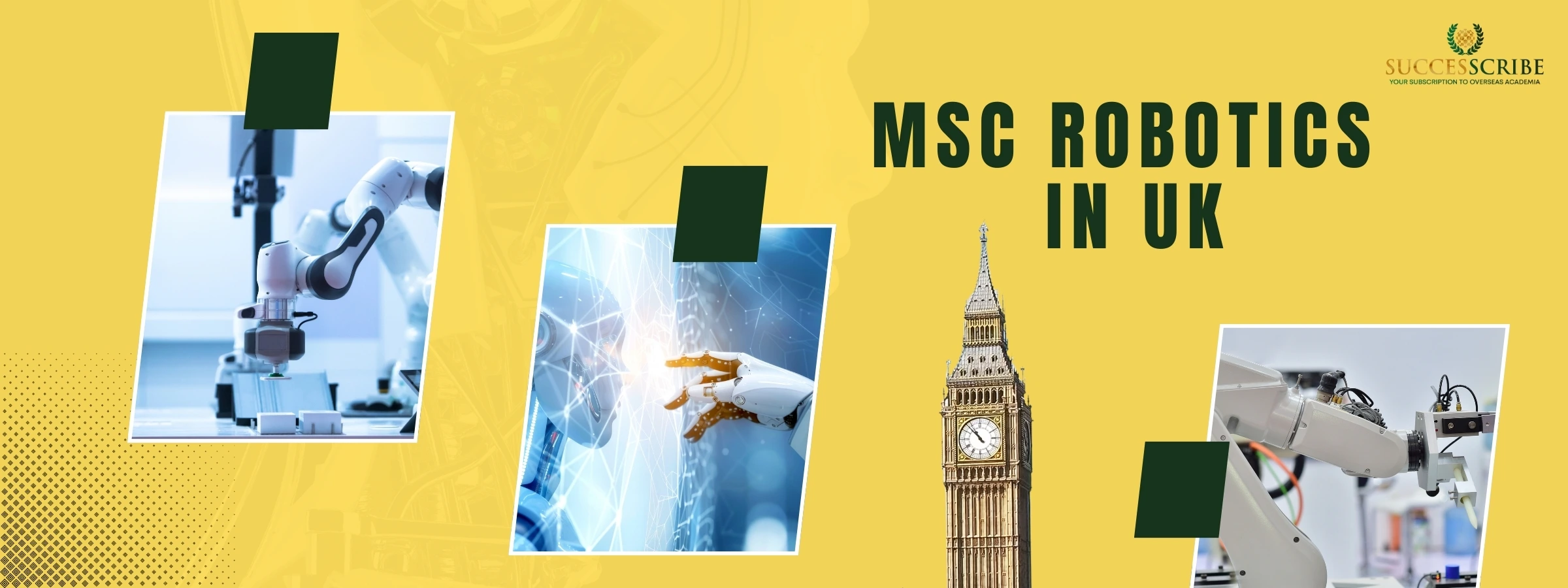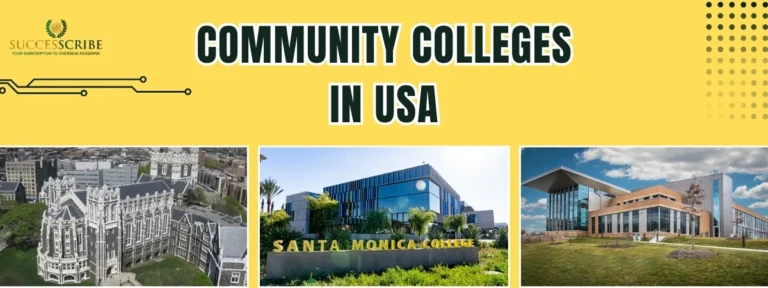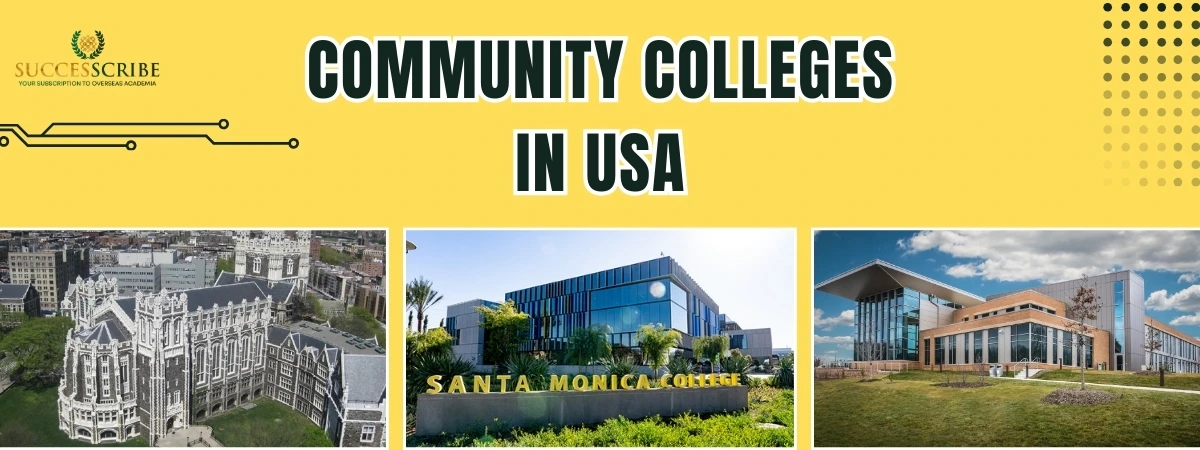The global robotics market is not just growing; it is exploding. Valued at approximately $45.85 billion in 2022, it is projected to reach a staggering $115.88 billion by 2029, expanding at a Compound Annual Growth Rate (CAGR) of 14.1%. At the heart of this technological revolution are the engineers, programmers, and innovators who design, build, and integrate intelligent robotic systems. For ambitious students who want to lead this transformation, pursuing an MSc Robotics in UK offers world-class education, cutting-edge research exposure, and direct access to global career opportunities.
Key Highlights – MSc Robotics in UK
- Global robotics market: $45.8B (2022) to $115.8B by 2029 (CAGR 14.1%).
- UK has 17 universities in QS Top 100 with world-class robotics programs.
- Top universities: Bristol, Manchester, Birmingham, Imperial, UCL, Edinburgh, King’s College London, Leeds, Heriot-Watt, Cranfield.
- Duration: 1 year full-time; some offer 2 years with placements.
- Research hubs: Bristol Robotics Lab, Oxford Robotics Institute, Edinburgh Centre for Robotics.
- Tuition fees: £20,000 – £37,000/year; living costs: £9,000 – £18,000/year (city dependent).
- Scholarships: Chevening, Commonwealth, GREAT, Rhodes, Clarendon, Gates Cambridge, Felix, Inlaks, plus university awards.
- Career roles: Robotics Engineer, AI Researcher, Mechatronics Engineer, Autonomous Vehicle Engineer.
- Average salaries: £35,000 – £65,000/year.
- Future scope: High demand in healthcare, autonomous vehicles, automation & AI-driven robotics.
- Visa: Proof of funds £10,224–£13,347, visa fee £524, work rights 20 hrs/week.
Why Study MSc Robotics in UK?
Choosing the UK for your master’s in robotics comes with multiple advantages. Let’s break down the most compelling reasons:
1. World-Class Universities
- The UK houses 17 universities ranked among the top 100 globally (QS 2024).
- Universities like Imperial College London, University of Oxford, and University of Edinburgh are globally recognized for robotics, AI, and computer science.
2. Demand for Robotics Professionals
- In 2024, there are over 3.5 million operational robots worldwide, with demand projected to double by 2030.
- The UK alone faces a shortage of over 100,000 robotics and AI professionals.
3. Strong Industry Links
- The UK robotics sector collaborates with companies like BAE Systems, Dyson, Rolls-Royce, and Jaguar Land Rover.
- Students gain hands-on experience through industrial placements, internships, and live projects.
4. Innovation Hubs & Research Opportunities
- The UK invests heavily in AI and robotics research, with more than £1 billion committed to AI research funds since 2021.
- Leading labs such as the Oxford Robotics Institute and Edinburgh Centre for Robotics are pioneers in autonomous systems and humanoid robots.
5. Scholarship Opportunities
- Prestigious funding options like Chevening, Commonwealth, GREAT Scholarships, and university-specific aid make studying affordable for international students.
6. Multicultural Student Experience
- The UK hosts over 680,000 international students (HESA, 2023), making it one of the most diverse educational hubs in the world.
Best Universities for MSc Robotics in UK
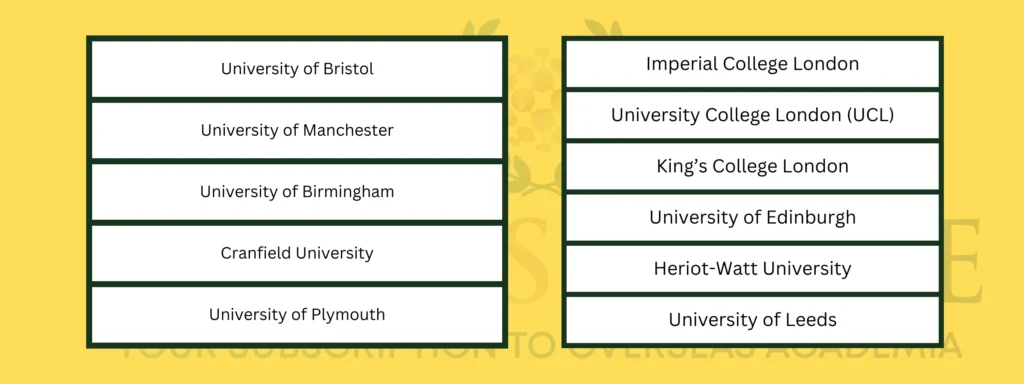
Choosing the right university is the first step towards a successful robotics career. The UK is home to world-class institutions offering specialized robotics programs backed by cutting-edge labs, industry collaborations, and global rankings. Below are the top universities where you can pursue an MSc in Robotics or closely related fields.
Universities Offering Pure MSc Robotics Degrees
These universities offer standalone master’s degrees explicitly titled “MSc Robotics.” If you want a course that is fully dedicated to robotics, these are the top choices.
| University | QS World Ranking | Course | Tuition Fees (Approx.) | Key Highlights |
| University of Bristol | 62 | MSc Robotics | £35,400 | Access to Bristol Robotics Laboratory (Europe’s largest robotics research center). Focus on AI-driven robotics, human–robot interaction, and automation. |
| University of Manchester | 34 | MSc Robotics | £36,500 | Combines mechatronics, AI, and autonomous systems. Multidisciplinary approach with high employability. |
| University of Birmingham | 80 | MSc Robotics | £29,340 | Strong focus on engineering design, AI, and medical robotics. Ranked among UK’s top 10 for engineering. |
| Cranfield University | N/A (postgraduate specialist) | MSc Robotics | £24,000 | Industry-focused, with strengths in aerospace, defense, and industrial robotics. |
| University of Plymouth | 561–570 | MSc Robotics | £19,800 | Affordable robotics program with emphasis on practical projects and applied robotics. |
Universities Offering Robotics-Related MSc Programs
Prestigious universities offer robotics-focused programs under titles like AI, computation, or mechatronics, still highly relevant to MSc Robotics in UK.
| University | QS World Ranking | Course | Tuition Fees (Approx.) | Key Highlights |
| Imperial College London | 2 | MSc Control, Signals & Robotics | £35,000 | Global top-10 university. Advanced robotics, control systems, and automation research. |
| University College London (UCL) | 9 | MSc Robotics & Computation | £31,100 | Combines robotics with computational AI. 90% graduate employability within 6 months. |
| King’s College London | 40 | MSc Robotics | £30,000 | Blends robotics, AI, and medical robotics. Strong healthcare robotics focus. |
| University of Edinburgh | 27 | MSc Robotics & Autonomous Systems | £25,650 | Home to the Edinburgh Centre for Robotics (with Heriot-Watt). Focus on AI, autonomous vehicles, and space robotics. |
| Heriot-Watt University | 281 | MSc Robotics & Autonomous Systems | £24,048 | Partnered with University of Edinburgh. Expertise in human–robot interaction and autonomous systems. |
| University of Leeds | 75 | MSc Mechatronics & Robotics | £29,750 | Renowned for medical robotics and advanced automation research. |
- Pure MSc Robotics: Best suited for students who want 100% robotics-focused degrees (Bristol, Manchester, Birmingham).
- Robotics-related MSc: Perfect if you want robotics plus AI, computation, or mechatronics (Imperial, UCL, Edinburgh).
Course Structure & Curriculum – MSc Robotics in UK
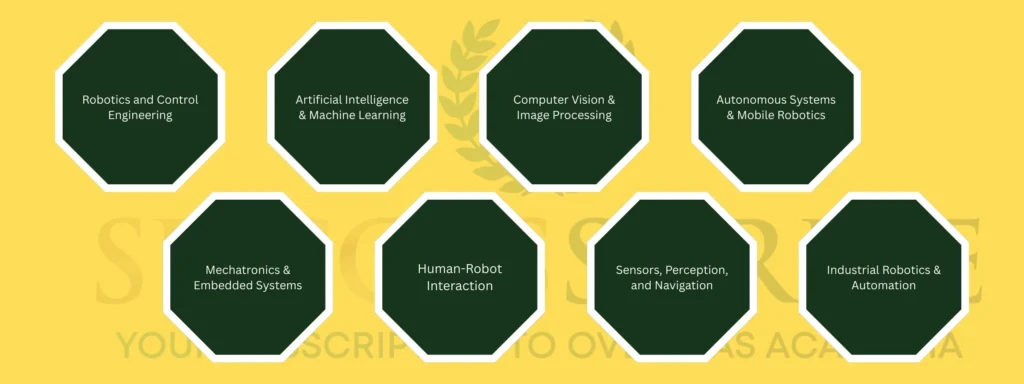
An MSc Robotics in UK typically lasts for 12 months full-time and combines theoretical foundations with hands-on practical projects.
Core Modules
- Robotics and Control Engineering
- Artificial Intelligence & Machine Learning
- Computer Vision & Image Processing
- Autonomous Systems & Mobile Robotics
- Mechatronics & Embedded Systems
- Human-Robot Interaction
- Sensors, Perception, and Navigation
- Industrial Robotics & Automation
Practical Components
- Lab Work: Students work with industrial robots like ABB, KUKA, and UR robots.
- Industry Placement/Internship: Many universities offer 3–6 months placements with robotics firms.
- Capstone Project/Dissertation: A research-based project often linked with industry collaborations.
Eligibility & Admission Requirements for MSc Robotics in the UK
Getting admission into an MSc Robotics in UK requires strong academic credentials, English proficiency, and in some cases, relevant work or research experience. While exact requirements vary by university, most top institutions follow a similar framework.
Academic Eligibility
Most UK universities require students to have a Bachelor’s degree in a relevant discipline.
| Requirement | Typical Expectation | Notes |
| Undergraduate Degree | Bachelor’s in Engineering, Computer Science, Physics, Electronics, Mechatronics, or Mathematics | Degrees outside these fields may be considered if strong in mathematics/programming. |
| Minimum Score | 2:1 UK Honours (equivalent to 60–70% or CGPA 3.0/4.0) | Some universities may accept 2:2 with relevant work experience. |
| Final Year Students | Conditional offers may be given | Students must submit final results before enrollment. |
English Language Proficiency
Since courses are taught in English, international students must prove their language ability.
| Test | Minimum Score (Typical) | Top Universities Requirement |
| IELTS Academic | Overall 6.5 – 7.0 (no band below 6.0) | Top Universities often require 7.0 – 7.5 |
| TOEFL iBT | 88 – 100 overall | With minimum 20–22 in each section |
| PTE Academic | 62 – 76 overall | Minimum 59 in each component |
| Duolingo (some unis) | 110 – 120 | Accepted by a limited universities |
Exemption: Students from countries where English is the official language or those who studied their undergraduate degree fully in English may be exempt from these tests.
Standardized Tests
- GRE: Not compulsory for most UK universities. However, a strong GRE score may strengthen applications at highly competitive universities.
- GATE: Rarely required; some UK universities may accept it from Indian students as additional proof of academic ability.
Work Experience & Technical Background
Work experience is not mandatory for MSc Robotics admission in the UK, but having relevant academic projects or professional exposure significantly strengthens an application. Universities also value technical skills and programming knowledge, since robotics heavily relies on software and algorithmic development.
Preferred Background
- Engineering Disciplines: Mechanical, Electrical, Electronics, Mechatronics, Computer Science, or related fields.
- Mathematical Foundations: Strong skills in linear algebra, control systems, calculus, probability, and statistics.
- Programming Knowledge (highly valued)
- Python – widely used for AI, ML, and robotics simulations.
- C/C++ – essential for hardware-level robotics programming.
- MATLAB/Simulink – for control systems and algorithm testing.
- ROS (Robot Operating System) – standard framework for building and simulating robots.
Work Experience (Optional but Beneficial)
- 1–2 years in robotics, automation, AI, embedded systems, or mechatronics industries.
- Internship experience in robotics labs or industrial projects (e.g., with ABB, Siemens, Dyson, or automotive companies).
- Participation in robotics competitions, hackathons, or AI projects (e.g., RoboCup, IEEE Robotics Challenges).
Documents Required for Application
To apply for MSc Robotics, students typically need to submit:
- Academic transcripts (Bachelor’s degree + previous qualifications)
- English proficiency test results (IELTS/TOEFL/PTE)
- Statement of Purpose (SOP) – outlining interest in robotics and career goals
- Letters of Recommendation (usually 2 academic/1 professional)
- Updated CV/Resume with academic projects or work experience
- Passport copy & other ID proofs
MSc Robotics in UK – Fees

Understanding tuition costs helps you plan your academic journey without financial surprises.
| University Tier | Annual Tuition Fees (International Students) | Examples |
| Top Universities | £30,000 – £37,000 | Imperial, Oxford, Edinburgh |
| Mid-Range Universities | £25,000 – £29,000 | Manchester, Bristol, Leeds |
| Affordable Options | £20,000 – £24,000 | Loughborough, Sheffield, Warwick |
On average, international students spend £28,000 – £32,000 per year on tuition for MSc Robotics.
Cost of Living in the UK (per year, approx.)
Living expenses vary widely by city, so choosing the right location can save you thousands each year.
| City/Region | Living Costs (Accommodation + Food + Travel) | Notes |
| London | £15,000 – £18,000 | Higher rent, transport, food costs |
| Major Cities (Manchester, Bristol, Edinburgh) | £11,000 – £14,000 | Balanced Lifestyle costly |
| Smaller Cities (Sheffield, Loughborough, Coventry) | £9,000 – £12,000 | More affordable housing & living |
Scholarships for MSc Robotics in the UK
Support that elevates both your learning and resume, with opportunities tailored for outstanding Indian applicants too.
| Scholarship | Coverage | Notes |
| Chevening Scholarship | Full tuition, monthly stipend, airfare, visa fee | Highly competitive; Indian students with leadership potential and 2+ years work experience are eligible |
| CommonwealthScholarships | Tuition, stipend, airfare, research & thesis travel grants | For students from Commonwealth countries, including India |
| GREAT Scholarships (Science & Tech) | Min. £10,000 towards tuition | Available to Indian students in STEM disciplines |
| Clarendon Fund (Oxford) | Full tuition + living expenses | Automatic consideration with application; merit-based |
| Gates Cambridge Scholarships | Full tuition, living stipend, airfare, family allowance | For exceptional Indian students applying for MSc or MPhil at Cambridge |
| Rhodes Scholarships (Oxford) | Full tuition + annual stipend (£18,180) | For top-tier Indian applicants aged ≤ 28, various disciplines included |
| Felix Scholarships | Full tuition, living expenses, airfare | For underprivileged Indian students pursuing master’s at Oxford, Reading, or SOAS |
| Inlaks Shivdasani Foundation Scholarships | Tuition, living, one-way airfare | High-achieving Indian students for full-time UK master’s degrees |
| University-Specific Scholarships | Varies widely (e.g., £2k–£15k) | Many UK universities offer scholarships for merit or nationality; robotics-related courses often included |
Job Opportunities After MSc Robotics in the UK

Graduates with MSc Robotics are in high demand globally. In the UK, average salaries range between £35,000 – £65,000 annually, depending on role and experience.
Future Scope of Robotics
The future of robotics is limitless. Key trends include:
- Healthcare Robotics: Global market expected to reach $43 billion by 2032.
- Autonomous Vehicles: Projected to be a $300 billion industry by 2030.
- Service Robots: Demand rising in hospitality, agriculture, and logistics.
- AI-Powered Robotics: Integration of AI and machine learning into robotics is revolutionizing industries.
In the UK, robotics is a government-priority sector, with investments flowing into smart factories, defense, and healthcare robotics, ensuring graduates have long-term career growth.
Career Roles & Salaries
| Job Role | Average Salary (GBP) |
| Robotics Engineer | £40,000 – £55,000 |
| AI Researcher | £42,000 – £60,000 |
| Automation Specialist | £38,000 – £52,000 |
| Mechatronics Engineer | £37,000 – £50,000 |
| Data Scientist (Robotics) | £45,000 – £65,000 |
| Autonomous Vehicle Engineer | £50,000 – £70,000 |
| Control Systems Engineer | £40,000 – £55,000 |
Challenges and Future Trends
Pursuing an MSc Robotics in the UK is competitive, with programs like Manchester’s receiving over 500 applications for 50 places annually. Keeping pace with rapid advancements in AI and robotics requires continuous learning, and universities are integrating emerging topics like ethics and regulation into curricula.
Future trends include:
- Ethical Robotics: Addressing bias in AI-driven robots.
- Human-Robot Collaboration: Developing robots that work seamlessly with humans.
- Soft Robotics: Innovating flexible, bio-inspired robots for healthcare.
By 2030, 60% of robots are expected to incorporate advanced AI, driving demand for skilled graduates.
Robotics Research in the UK – Stats & Research Hubs
The UK is at the forefront of robotics innovation, supported by some of the largest and most advanced research centres in Europe.
- Bristol Robotics Laboratory (BRL): The UK’s largest academic robotics lab (4,600 m²), focusing on swarm robotics, machine vision, and human–robot interaction.
- Oxford Robotics Institute (ORI): Specializes in autonomous systems, soft robotics, and AI-driven robotics.
- Edinburgh Centre for Robotics: Renowned for humanoid robotics and AI integration, led by globally recognized researchers.
Recent Statistics
- In 2023, UK manufacturing installed 3,083 industrial robots (a 51% increase year-on-year).
- The UK robotics market was worth USD 693 million in 2023, expected to grow to USD 1.08 billion by 2030 (CAGR 6.6%).
- Overall robotics revenue (industrial + service) is projected to reach USD 3.92 billion by 2029, with a CAGR of 16.25%.
Visa Requirements for MSc Robotics in the UK
Planning your study journey requires understanding the updated UK student visa rules.
Financial Proof:
- Studying in London – £1,483/month – £13,347 (9 months)
- Studying outside London – £1,136/month – £10,224 (9 months)
- Funds must be held for 28 consecutive days, ending within 31 days of visa application.
Other Costs:
- Visa Fee – £524
- Immigration Health Surcharge (IHS) – £776/year
Work Rights:
- 20 hours/week during term time.
- Full-time during official breaks.
Conclusion
The world is advancing toward automation at lightning speed, with the robotics industry projected to exceed $160 billion by 2030. In this revolution, the UK has positioned itself as a hub for innovation, research, and world-class education. With more than a dozen top-ranked universities offering MSc Robotics in UK, students gain access to cutting-edge labs, global internships, and a diverse student community. Tuition fees range between £20,000 and £32,000, with scholarships reducing financial barriers. Graduates step into high-paying careers, earning £35,000–£70,000 annually, while shaping the future of healthcare, AI, and autonomous technologies.
FAQs
What is the duration of an MSc Robotics course in the UK?
Most MSc Robotics programs in the UK are 1 year full-time. Some universities also offer a 2-year option with industry placement, giving students hands-on experience.
What are the tuition fees for MSc Robotics in the UK?
Tuition fees typically range between £20,000 – £32,000 per year for international students. The exact cost depends on the university and whether the program includes a placement year.
Do I need work experience to apply for MSc Robotics in the UK?
Work experience is not mandatory for most universities, but having knowledge in robotics, AI, or coding can strengthen your application.
What are the job prospects after MSc Robotics in the UK?
Graduates work as Robotics Engineers, AI Specialists, Automation Consultants, Mechatronics Engineers, and Autonomous Vehicle Engineers. Starting salaries average £35,000 – £50,000 annually, with growth potential in high-demand industries.
Which UK universities are best for MSc Robotics?
Top universities include:
1. University of Bristol
2. Imperial College London
3. University of Edinburgh
4. Heriot-Watt University
5. University of Leeds
6. King’s College London
7. University College London (UCL)
Is MSc Robotics in the UK worth it?
Absolutely. The global robotics industry is booming, and the UK offers a blend of world-class education, cutting-edge labs, and industry connections. With strong employability and high salary prospects, MSc Robotics in the UK is a solid investment for students aiming to build a future in AI, automation, and robotics.
Related Post
Executive mba in UK
MBA in UK without work experience
Best universities for mba in UK
One year mba in UK

